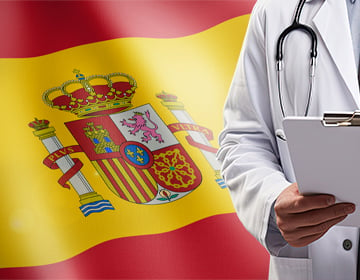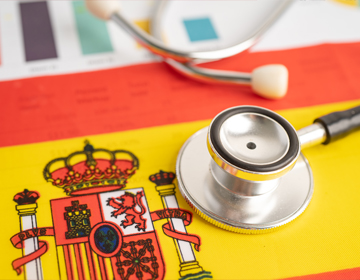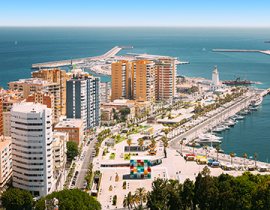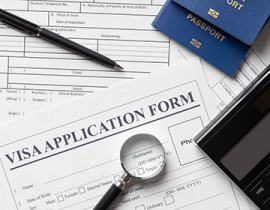The Healthcare System in Spain
The Spanish healthcare system is available to everyone, no matter where they come from or how much money they have. This is because it's a system that's supported by taxes, with the national and local governments both involved in managing it.
The expenses related to healthcare differ among European nations and big cities, influenced by elements like the range of services provided, how effectively healthcare is administered, and the amount of public money invested.
However, Spain's healthcare system typically provides a good return on investment, focusing on ensuring everyone has access to care, prioritizing primary healthcare, and delivering services in a cost-efficient manner.
What are the Main Differences Between Public and Private Healthcare in Spain?
 In Spain, the healthcare system is a mix of both public and private sectors, providing various choices for people in need of medical attention. Here are the primary distinctions between public and private healthcare in Spain:
In Spain, the healthcare system is a mix of both public and private sectors, providing various choices for people in need of medical attention. Here are the primary distinctions between public and private healthcare in Spain:
Public Healthcare
In Spain, the main source of money for public healthcare comes from taxes, and it is managed by the state. Its goal is to offer healthcare services to everyone living in the country, no matter their financial situation. The system is supported by payments from both the national and local governments.
The public healthcare system provides coverage for everyone living there, allowing them to use a variety of medical services such as basic care, specialized care, care in Spain’s hospitals, and urgent care. Individuals don't have to worry much about paying for these services directly.
Medicine and healthcare in Spain are usually paid for by taxes, and most of these services are free to locals when they are used. People might have to pay a small amount of money themselves for some treatments or medicines.
Private Healthcare
Private medical centers and services are managed by private businesses or private individuals. Individuals usually cover the costs of private medical services using their private health insurance in Spain, direct payments, or health plans provided by their employers.
Private medical services frequently provide faster entry into healthcare, featuring reduced delays for doctor visits and surgeries when contrasted with government-run healthcare.
 Private medical services might also include benefits like exclusive private spaces, more tailored care, and a wider selection of optional surgeries and therapies.
Private medical services might also include benefits like exclusive private spaces, more tailored care, and a wider selection of optional surgeries and therapies.
Nonetheless, private medical services might not be as universally accessible or available to everyone, particularly individuals with modest financial means.
In Spain, private medical services usually cost more than those provided by the public sector. This is because individuals need to cover the expenses themselves or via private health insurance to use these services.
Quality and Access
In Spain, the public health care centers are usually fully equipped and have a team of skilled medical staff. While it's possible to experience long wait times for non-urgent treatment in the public healthcare system, the quality of care is often equivalent to that found in private medical establishments.
Private medical centers usually provide greater degrees of ease, accessibility, and features, like reduced waiting periods, upscale facilities, and increased individualized care from healthcare professionals. Nonetheless, the standard of care in private medical environments can differ based on the establishment and the skill of the medical staff.
In general, deciding on whether to use public or private healthcare in Spain is influenced by personal likes, money available, and the particular health requirements of the person. Public healthcare is known for being available to everyone and being less expensive, whereas private healthcare can give faster service and more tailored care for those who can afford it.
How do I Register with the National Health System in Spain?
 To use the National Health Service in Spain, you usually have to be a resident of the nation legally. This implies that you need a current residency card or be a Spanish citizen or from another home country in the European Union (EU).
To use the National Health Service in Spain, you usually have to be a resident of the nation legally. This implies that you need a current residency card or be a Spanish citizen or from another home country in the European Union (EU).
Locate the closest medical facility or basic healthcare provider in your area. These places are the first destination for individuals looking for medical assistance.
Visit the health center directly and tell the employees that you want to sign up with the National Health Service. You might have to carry specific papers with you, like an Identity Card, evidence of living in the area, Social Security number, and any other papers the health center asks for.
You'll need to complete registration forms that require your details, contact information, and additional pertinent information.
After your sign-up is completed, you'll receive a health card that acts as evidence of your right to receive medical care through the National Health Service.
In certain areas of Spain, you might be required to select a primary care doctor or have one selected for you by the health facility. This primary care doctor will serve as your primary contact for non-urgent healthcare needs.
You might have to activate your health card for healthcare services by scheduling an appointment or following a particular procedure.
After signing up with the National Health Service and obtaining your health card, you'll gain access to medical services, such as primary care, specialized care, and urgent care, often at minimal or no expense, based on your situation.
If you'd like to find out more about the best places to live in Spain for your project concerning of move to Spain, as well as discover sustainable travel and living destinations in Spain, check out our articles in the Blog section of our website.









